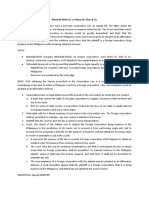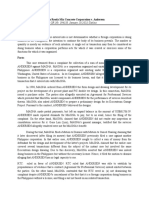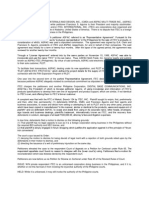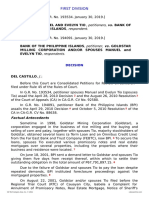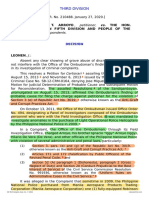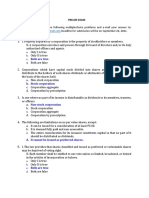Eriks Pte. Ltd. v. CA Eriks Pte. Ltd. v. CA: Corporate Law Case Write-Up February 6, 1997
Eriks Pte. Ltd. v. CA Eriks Pte. Ltd. v. CA: Corporate Law Case Write-Up February 6, 1997
Uploaded by
Christine SumawayCopyright:
Available Formats
Eriks Pte. Ltd. v. CA Eriks Pte. Ltd. v. CA: Corporate Law Case Write-Up February 6, 1997
Eriks Pte. Ltd. v. CA Eriks Pte. Ltd. v. CA: Corporate Law Case Write-Up February 6, 1997
Uploaded by
Christine SumawayOriginal Title
Copyright
Available Formats
Share this document
Did you find this document useful?
Is this content inappropriate?
Copyright:
Available Formats
Eriks Pte. Ltd. v. CA Eriks Pte. Ltd. v. CA: Corporate Law Case Write-Up February 6, 1997
Eriks Pte. Ltd. v. CA Eriks Pte. Ltd. v. CA: Corporate Law Case Write-Up February 6, 1997
Uploaded by
Christine SumawayCopyright:
Available Formats
Corporate Law Case Write-up February 6, 1997
Eriks Pte. Ltd. v. CA Eriks Pte. Ltd. v. CA
I. Facts of the case prohibits, not merely absence of the prescribed license, but it also
bars a foreign corporation “doing business” in the Philippines
Petitioner Eriks Pte. Ltd. is a non-resident foreign corporation without such license access to our courts. A foreign corporation
engaged in the manufacture and sale of elements used in sealing without such license is not ipso facto incapacitated from bringing an
pumps, valves and pipes for industrial purposes. In Eriks Pte. Ltd. action. A license is necessary only if it is “transacting or doing
own complaint, it alleged that it was duly organized under the laws business” in the country.
of Singapore, it is not licensed to do business in the Philippines, and
is suing on an isolated transaction for which it has capacity to sue. RA 7042 and jurisprudence defined what “doing business” in
the Philippines. The term implies a continuity of commercial
On various dates covering the period January 17 — August 16, dealings and arrangements, and contemplates, to that extent, the
1989, Delfin Enriquez, Jr. ordered and received from Eriks various performance of acts or works or the exercise of some of the functions
elements used in sealing pumps, valves, pipes and control normally incident to, and in progressive prosecution of, the purpose
equipment, PVC pipes and fittings. The transfers of goods were and object of its organization. The accepted rule in jurisprudence is
perfected in Singapore, in Enriquez’s account, with a 90-day credit that each case must be judged in the light of its own environmental
term. Demands were made upon Enrique to settle his account, but he circumstances. The purpose of the law is not to prevent the foreign
failed/refused to do so. Eriks then filed for the recovery of corporation from performing single or isolated acts, but to bar it
$41,939.63 or its equivalent in Philippine currency, plus interest from acquiring a domicile for the purpose of business without first
thereon and damages. Enriquez responded with a Motion to Dismiss, taking the steps necessary to render it amenable to suits in the local
contending that Eriks had no legal capacity to sue. courts.
II. Issue/s In this case, both the RTC and CA found that the transaction
between Eriks and Enriquez cannot be considered an isolated one.
Whether or not Eriks Pte. Ltd. may maintain an action in Philippine There were 17 orders and deliveries over a four-month period.
courts considering that it has no license to do business in the Enriquez made separate orders at various dates. The transactions did
country? not consist of separate deliveries for one single order. In the case at
bar, the transactions entered into are a series of commercial dealings
III. Held which would signify an intent on the part of Eriks Pte. Ltd. to do
business in the Philippines.
NO. Sec. 133 provides, “No foreign corporation transacting
business in the Philippines without a license, or its successors or More than the sheer number of transactions entered into, a clear
assigns, shall be permitted to maintain or intervene in any action, suit and unmistakable intention on the part of Eriks to continue the body
or proceeding in any court or administrative agency of the of its business in the Philippines is more than apparent. Eriks grant
Philippines; but such corporation may be sued or proceeded against and extension of 90-day credit terms to Enriquez for every purchase
before Philippine courts or administrative tribunals on any valid made, unarguably shows an intention to continue transacting with
cause of action recognized under Philippine laws.” The provision Enriquez, since in the usual course of commercial transactions, credit
G.R. NO: 118843 PONENTE: Panganiban, J.
ARTICLE; TOPIC OF CASE: Foreign corporation DIGEST MAKER: Kim
Corporate Law Case Write-up February 6, 1997
Eriks Pte. Ltd. v. CA Eriks Pte. Ltd. v. CA
is extended only to customers in good standing or to those on whom
there is an intention to maintain long-term relationship. What is
determinative of "doing business" is not really the number or the
quantity of the transactions, but more importantly, the intention of an
entity to continue the body of its business in the country. The
number and quantity are merely evidence of such intention. The
phrase "isolated transaction" has a definite and fixed meaning, i.e. a
transaction or series of transactions set apart from the common
business of a foreign enterprise in the sense that there is no intention
to engage in a progressive pursuit of the purpose and object of the
business organization.
Accordingly, Eriks Pte. Ltd. must be held to be incapacitated to
maintain the action against Enriquez. It was never the intent of the
legislature to bar court access to a foreign corporation or entity
which happens to obtain an isolated order for business in the
Philippines. Neither did it intend to shield debtors from their
legitimate liabilities or obligations. But it cannot allow foreign
corporations or entities which conduct regular business any access to
courts without the fulfillment by such corporations of the necessary
requisites to be subjected to our government's regulation and
authority. By securing a license, the foreign entity would be giving
assurance that it will abide by the decisions of our courts, even if
adverse to it.
IV. Critic
G.R. NO: 118843 PONENTE: Panganiban, J.
ARTICLE; TOPIC OF CASE: Foreign corporation DIGEST MAKER: Kim
You might also like
- Cover Letter For Rental ApplicationDocument8 pagesCover Letter For Rental Applicationafjwdbaekycbaa100% (2)
- Labor Jurisdiction and RemediesDocument8 pagesLabor Jurisdiction and RemediesAudreyNo ratings yet
- Simple Guide for Drafting of Civil Suits in IndiaFrom EverandSimple Guide for Drafting of Civil Suits in IndiaRating: 4.5 out of 5 stars4.5/5 (4)
- Consignment Contract 2-14-16Document3 pagesConsignment Contract 2-14-16api-304095757No ratings yet
- Eriks PTE V. CA - G.R. No. 118843 (Case DIGEST)Document3 pagesEriks PTE V. CA - G.R. No. 118843 (Case DIGEST)Kenette Diane CantubaNo ratings yet
- Case Analysis 6Document9 pagesCase Analysis 6icesootNo ratings yet
- Remedying The Unfit Fitted Kitchen-Robert BradgateDocument4 pagesRemedying The Unfit Fitted Kitchen-Robert BradgateBarbara WatersNo ratings yet
- Finlaw Batch 2 PDFDocument22 pagesFinlaw Batch 2 PDFXylem SalvatoreNo ratings yet
- G.R. No. 118843 February 6, 1997 ERIKS PTE. LTD., Petitioner, COURT OF APPEALS, and DELFIN F. ENRIQUEZ, JR., RespondentsDocument1 pageG.R. No. 118843 February 6, 1997 ERIKS PTE. LTD., Petitioner, COURT OF APPEALS, and DELFIN F. ENRIQUEZ, JR., RespondentsJames WilliamNo ratings yet
- Part 2-Case Digest (Foreign Corporation)Document11 pagesPart 2-Case Digest (Foreign Corporation)Patatas SayoteNo ratings yet
- Eriks Pte. Ltd. v. Court of Appeals and Delfin F. Enriquez, JR., - G.R. No. 118843, February 6, 1997, J. Panganiban - Palomo (Digest)Document2 pagesEriks Pte. Ltd. v. Court of Appeals and Delfin F. Enriquez, JR., - G.R. No. 118843, February 6, 1997, J. Panganiban - Palomo (Digest)FRANCOIS AMOS PALOMONo ratings yet
- G.R. No. 118843. February 6, 1997 Eriks Pte. LTD., Petitioner, vs. Court of Appeals and Delfin F. Enriquez, JR., Respondents. FactsDocument1 pageG.R. No. 118843. February 6, 1997 Eriks Pte. LTD., Petitioner, vs. Court of Appeals and Delfin F. Enriquez, JR., Respondents. Factsenan_intonNo ratings yet
- Case Digest: ERIKS v. CA: Eriks Pte. Ltd. V. Court of Appeals, Et Al. G.R. No. 118843, 6 February 1997 Panganiban, J.Document4 pagesCase Digest: ERIKS v. CA: Eriks Pte. Ltd. V. Court of Appeals, Et Al. G.R. No. 118843, 6 February 1997 Panganiban, J.Fritch GamNo ratings yet
- Eriks Pte. Ltd. v. Court of Appeals, G.R. No. 118843, 06 February 1997, (267 SCRA 567)Document3 pagesEriks Pte. Ltd. v. Court of Appeals, G.R. No. 118843, 06 February 1997, (267 SCRA 567)GWYNETH RICHELLE LIMNo ratings yet
- Eriks Pte., Ltd. vs. Court of Appeals G.R. No. 118843 (February 6, 1997)Document2 pagesEriks Pte., Ltd. vs. Court of Appeals G.R. No. 118843 (February 6, 1997)Tristan HaoNo ratings yet
- 02 Eriks Pte LTD V CADocument2 pages02 Eriks Pte LTD V CAKathrinaDeCastroI100% (2)
- G.R. No. 118843 February 6, 1997 ERIKS PTE. LTD., Petitioner, COURT OF APPEALS, and DELFIN F. ENRIQUEZ, JR., RespondentsDocument6 pagesG.R. No. 118843 February 6, 1997 ERIKS PTE. LTD., Petitioner, COURT OF APPEALS, and DELFIN F. ENRIQUEZ, JR., Respondentsbn_dcks9105No ratings yet
- Eriks Pte Ltd. vs. CADocument4 pagesEriks Pte Ltd. vs. CAvanessa_3100% (1)
- CORPO - 64. Eriks v. CADocument1 pageCORPO - 64. Eriks v. CARS SuyosaNo ratings yet
- G.R. No. 147905 May 28, 2007 B. VAN ZUIDEN BROS., LTD., Petitioner, GTVL Manufacturing Industries, Inc., Respondent. Carpio, J.: The CaseDocument2 pagesG.R. No. 147905 May 28, 2007 B. VAN ZUIDEN BROS., LTD., Petitioner, GTVL Manufacturing Industries, Inc., Respondent. Carpio, J.: The CasedonsiccuanNo ratings yet
- B. Van Zuiden v. GVTLDocument6 pagesB. Van Zuiden v. GVTLMari DesNo ratings yet
- Van Zuiden Bros. Ltd. v. GTVL Manufacturing, G.R. No. 147905, 28 May 2007Document6 pagesVan Zuiden Bros. Ltd. v. GTVL Manufacturing, G.R. No. 147905, 28 May 2007Anonymous PcPkRpAKD5No ratings yet
- Petitioner Vs Vs Respondent: Second DivisionDocument5 pagesPetitioner Vs Vs Respondent: Second Divisiondenbar15No ratings yet
- G.R. No. 147905 May 28, 2007 B. Van Zuiden Bros., LTD., vs. GTVL Manufacturing Industries, Inc. The CaseDocument15 pagesG.R. No. 147905 May 28, 2007 B. Van Zuiden Bros., LTD., vs. GTVL Manufacturing Industries, Inc. The CaseEdmund Pulvera Valenzuela IINo ratings yet
- ERIKS PTE. LTD v. CADocument5 pagesERIKS PTE. LTD v. CAAnjanette MangalindanNo ratings yet
- Marshall Wells v. ElserDocument1 pageMarshall Wells v. ElserFrances Angelica Domini KoNo ratings yet
- 10 Uy Siuliong Vs DirectorDocument2 pages10 Uy Siuliong Vs DirectorImariNo ratings yet
- Communication Materials and Design vs. CaDocument4 pagesCommunication Materials and Design vs. CaAbigail PanongNo ratings yet
- BBL112 022415Document46 pagesBBL112 022415Claude PeñaNo ratings yet
- G.R. No. 102223 - Communications Materials and Design, Inc. v. CourtDocument17 pagesG.R. No. 102223 - Communications Materials and Design, Inc. v. CourtKaren Gina DupraNo ratings yet
- B. Van Zuiden Bros. Ltd. v. GTVL Manufacturing, G.R. No. 147905, 28 May 2007 FactsDocument7 pagesB. Van Zuiden Bros. Ltd. v. GTVL Manufacturing, G.R. No. 147905, 28 May 2007 FactsAnonymous PcPkRpAKD5No ratings yet
- Problem 13Document4 pagesProblem 13Ashley CandiceNo ratings yet
- Marshall-Wells Vs ElserDocument1 pageMarshall-Wells Vs ElserCJNo ratings yet
- MARSHALL-WELLS COMPANY, Plaintiff-Appellant, vs. HENRY W. ELSER & CO., INC., Defendant-Appellee. Malcolm, JDocument15 pagesMARSHALL-WELLS COMPANY, Plaintiff-Appellant, vs. HENRY W. ELSER & CO., INC., Defendant-Appellee. Malcolm, JCJVNo ratings yet
- B. Van Zuiden Bros., Ltd. v. GTVL Manufacturing Industries, IncDocument3 pagesB. Van Zuiden Bros., Ltd. v. GTVL Manufacturing Industries, IncSecret BookNo ratings yet
- Corpo FinalsDocument28 pagesCorpo Finalscris baligodNo ratings yet
- Conflict of LawsDocument113 pagesConflict of LawsJoedhel ApostolNo ratings yet
- 12 B. Van Zuiden Bros. vs. GTVL Manufacturing, G.R. No. 147905. May 28, 2007Document3 pages12 B. Van Zuiden Bros. vs. GTVL Manufacturing, G.R. No. 147905. May 28, 2007JNo ratings yet
- 12 B. Van Zuiden Bros. vs. GTVL Manufacturing G.R. No. 147905. May 28 2007Document3 pages12 B. Van Zuiden Bros. vs. GTVL Manufacturing G.R. No. 147905. May 28 2007JNo ratings yet
- Marshall Wells Vs Henry ElserDocument2 pagesMarshall Wells Vs Henry ElserCarmille Marge MercadoNo ratings yet
- Petitioners Vs Vs Respondents Reynaldo A. Dario Oreta & BerenguerDocument14 pagesPetitioners Vs Vs Respondents Reynaldo A. Dario Oreta & Berenguerpaul esparagozaNo ratings yet
- B. Van Zuiden v. GTVL Manufacturing, G.R. No. 147905, May 28, 2007Document9 pagesB. Van Zuiden v. GTVL Manufacturing, G.R. No. 147905, May 28, 2007Alan Vincent FontanosaNo ratings yet
- G.R. No. 105141 August 31, 1993 SIGNETICS CORPORATION, Petitioner, Court of Appeals and Fruehauf Electronics Phils. Inc., RespondentsDocument8 pagesG.R. No. 105141 August 31, 1993 SIGNETICS CORPORATION, Petitioner, Court of Appeals and Fruehauf Electronics Phils. Inc., RespondentsJames WilliamNo ratings yet
- Facts:: Granger Associates C. Microwave, 189 SCRA 631 (1990)Document3 pagesFacts:: Granger Associates C. Microwave, 189 SCRA 631 (1990)FaithmaeNo ratings yet
- "Doing Business" Shall Not Be Deemed To Include Mere Investment As ADocument8 pages"Doing Business" Shall Not Be Deemed To Include Mere Investment As AJenny ButacanNo ratings yet
- G.R. No. 147905 - Civ Pro - VAN ZUIDEN BROS. V. GTVL MANUFACTURINGDocument6 pagesG.R. No. 147905 - Civ Pro - VAN ZUIDEN BROS. V. GTVL MANUFACTURINGDeb GonzalesNo ratings yet
- Marshall Wells Vs ElserDocument1 pageMarshall Wells Vs ElserEM RGNo ratings yet
- 237 Marshall Wells v. Elser (Bondoc)Document1 page237 Marshall Wells v. Elser (Bondoc)ASGarcia24No ratings yet
- Foreign CorporationDocument4 pagesForeign CorporationNLainie OmarNo ratings yet
- Corpo FinalsDocument23 pagesCorpo FinalsMelody Lim DayagNo ratings yet
- 31 Steelcase v. Design IntlDocument17 pages31 Steelcase v. Design IntlRozaiineNo ratings yet
- 242 Lacoste V Fernandez (Delfin)Document2 pages242 Lacoste V Fernandez (Delfin)ASGarcia24No ratings yet
- 164708-2010-Cargill Inc. v. Intra Strata Assurance Corp.20180921-5466-TsgketDocument8 pages164708-2010-Cargill Inc. v. Intra Strata Assurance Corp.20180921-5466-Tsgketdenbar15No ratings yet
- G.R. No. 118843Document7 pagesG.R. No. 118843Kelly ThompsonNo ratings yet
- Investment Law Digests For Sept. 20 and 27 Meeting PDFDocument11 pagesInvestment Law Digests For Sept. 20 and 27 Meeting PDFThea Gubalane100% (1)
- Steelcase Inc Vs DISIDocument3 pagesSteelcase Inc Vs DISIana ortizNo ratings yet
- Communication Materials and Design Inc. vs. CADocument25 pagesCommunication Materials and Design Inc. vs. CATammy YahNo ratings yet
- 23 Tuna Processing Inc v. Philippine KingfordDocument5 pages23 Tuna Processing Inc v. Philippine KingfordRio TolentinoNo ratings yet
- Second Division (G.R. No. 147905, May 28, 2007)Document5 pagesSecond Division (G.R. No. 147905, May 28, 2007)JamieNo ratings yet
- Magna Ready Mix Concrete Corporation v. AndersenDocument3 pagesMagna Ready Mix Concrete Corporation v. AndersenMichelle Marie Tablizo100% (2)
- Conflicts 2nd MeetingDocument90 pagesConflicts 2nd MeetingKing AlduezaNo ratings yet
- Third Division: Synopsis SynopsisDocument21 pagesThird Division: Synopsis SynopsisSarahNo ratings yet
- Cargill Vs Intra StrataDocument1 pageCargill Vs Intra StrataNaan AguilarNo ratings yet
- CMDI V CADocument3 pagesCMDI V CAFrederick Xavier LimNo ratings yet
- Petitioners: First DivisionDocument21 pagesPetitioners: First DivisionChristine SumawayNo ratings yet
- 20.218589-2019-Spouses Tio v. Bank of The Philippine Islands20210424-12-1oufitzDocument6 pages20.218589-2019-Spouses Tio v. Bank of The Philippine Islands20210424-12-1oufitzChristine SumawayNo ratings yet
- Petitioners Respondents: First DivisionDocument11 pagesPetitioners Respondents: First DivisionChristine SumawayNo ratings yet
- Corporation Law Digest Sumaway, Christine Joyce L (2B) Andaya V Rural Bank of Cabadbaran FactsDocument2 pagesCorporation Law Digest Sumaway, Christine Joyce L (2B) Andaya V Rural Bank of Cabadbaran FactsChristine SumawayNo ratings yet
- Petitioner Respondents: Pilipinas Shell Petroleum Corporation, CarlosDocument7 pagesPetitioner Respondents: Pilipinas Shell Petroleum Corporation, CarlosChristine SumawayNo ratings yet
- 11.207495-2017-Dutch Movers Inc. v. Lequin20220729-12-9jigwoDocument10 pages11.207495-2017-Dutch Movers Inc. v. Lequin20220729-12-9jigwoChristine SumawayNo ratings yet
- Petitioner: en BancDocument33 pagesPetitioner: en BancChristine SumawayNo ratings yet
- 8.208500-2017-Zambrano v. Philippine Carpet Manufacturing20220620-11-Js52w5Document13 pages8.208500-2017-Zambrano v. Philippine Carpet Manufacturing20220620-11-Js52w5Christine SumawayNo ratings yet
- 27.213201 2018 Villongco - v. - Yabut20210424 14 11h149bDocument13 pages27.213201 2018 Villongco - v. - Yabut20210424 14 11h149bChristine SumawayNo ratings yet
- Lim v. Moldex Land Inc. Lim v. Moldex Land Inc.: I. Facts of The Case III. HeldDocument2 pagesLim v. Moldex Land Inc. Lim v. Moldex Land Inc.: I. Facts of The Case III. HeldChristine SumawayNo ratings yet
- People v. SenoronDocument2 pagesPeople v. SenoronChristine SumawayNo ratings yet
- People v. PanisDocument3 pagesPeople v. PanisChristine SumawayNo ratings yet
- Darvin v. CADocument2 pagesDarvin v. CAChristine SumawayNo ratings yet
- 18 2017-Pioneer - Insurance - and - Surety - Corp. - v. - APL - Co.20220619-12-16sltft PDFDocument6 pages18 2017-Pioneer - Insurance - and - Surety - Corp. - v. - APL - Co.20220619-12-16sltft PDFChristine SumawayNo ratings yet
- People v. YabutDocument3 pagesPeople v. YabutChristine Sumaway100% (1)
- 16 2017-Land - Transportation - Franchising - And20220615-11-1efdttsDocument12 pages16 2017-Land - Transportation - Franchising - And20220615-11-1efdttsChristine SumawayNo ratings yet
- Practical Exercises Annex - 2022 Blue TipsDocument6 pagesPractical Exercises Annex - 2022 Blue TipsChristine SumawayNo ratings yet
- Civil Law - 2022 Blue TipsDocument31 pagesCivil Law - 2022 Blue TipsChristine Sumaway100% (1)
- 02 2011-Heirs - of - Ochoa - v. - G - S - Transport - Corp.20220119-12-Xm5nvq PDFDocument18 pages02 2011-Heirs - of - Ochoa - v. - G - S - Transport - Corp.20220119-12-Xm5nvq PDFChristine SumawayNo ratings yet
- People v. AbellaDocument3 pagesPeople v. AbellaChristine SumawayNo ratings yet
- LegETime Combinations Reviewer 2.0Document2 pagesLegETime Combinations Reviewer 2.0Christine SumawayNo ratings yet
- 04 Arroyo - v. - Sandiganbayan - Fifth - Division20210504-11-1itq7emDocument18 pages04 Arroyo - v. - Sandiganbayan - Fifth - Division20210504-11-1itq7emChristine SumawayNo ratings yet
- 04 5 Arroyo V Sandiganbayan Fifth Division20220701 11 1uu4sn8Document34 pages04 5 Arroyo V Sandiganbayan Fifth Division20220701 11 1uu4sn8Christine SumawayNo ratings yet
- Hgs Tax Reviewer 2022Document204 pagesHgs Tax Reviewer 2022Christine SumawayNo ratings yet
- Waiver and Release of Liability AND Release of Image For UseDocument4 pagesWaiver and Release of Liability AND Release of Image For UseSandeep GangadharanNo ratings yet
- Adille Vs CADocument1 pageAdille Vs CAMichelle Vale CruzNo ratings yet
- Canlas v. CADocument10 pagesCanlas v. CATokie TokiNo ratings yet
- Nova ConstructionDocument7 pagesNova ConstructionLevel BusinessNo ratings yet
- G.R. No. L-13125 - ROSALIO BAUTISTA vs. FRANCISCO SIOSON, ET ALDocument3 pagesG.R. No. L-13125 - ROSALIO BAUTISTA vs. FRANCISCO SIOSON, ET ALGene Michael MiguelNo ratings yet
- Promissory Note: Amount: $ - (Principal Amount) Dated: - , 20Document4 pagesPromissory Note: Amount: $ - (Principal Amount) Dated: - , 20Pavan KumarNo ratings yet
- MCQ PartnershipDocument24 pagesMCQ Partnershiplou-924No ratings yet
- Corporation Law NotesDocument32 pagesCorporation Law NotesGracious CondesNo ratings yet
- SBD Consultancy (ICB) - November-FinalDocument120 pagesSBD Consultancy (ICB) - November-FinalABAMELANo ratings yet
- Copy KCP Prelim Exam 09122021Document11 pagesCopy KCP Prelim Exam 09122021Cezanne Pi-ay EckmanNo ratings yet
- Formative AssessmentDocument5 pagesFormative AssessmentYash BhargavaNo ratings yet
- Lease and It's Types Under TPADocument10 pagesLease and It's Types Under TPAoggamer.2802No ratings yet
- Employment Contract: BetweenDocument3 pagesEmployment Contract: BetweenExpert PrintingNo ratings yet
- WaiverDocument1 pageWaiverapi-5520817820% (1)
- CONTRACT OF LEASE - LeponDocument2 pagesCONTRACT OF LEASE - Leponsonia vallenteNo ratings yet
- Act No 3344Document2 pagesAct No 3344Aling Kinai100% (2)
- Employment AgreementDocument3 pagesEmployment AgreementallecermarlonNo ratings yet
- Chapter 3Document26 pagesChapter 3Hannahlyn DiagoNo ratings yet
- Special Power of Attorney: Know All Men by These PresentsDocument1 pageSpecial Power of Attorney: Know All Men by These PresentsangelinamallanaoNo ratings yet
- 49 AGAG V ALPHA FINANCINGDocument2 pages49 AGAG V ALPHA FINANCINGFelix Gerard Jr. LeysonNo ratings yet
- Sales Representatives Manual Volume4 EnglishEdition PDFDocument203 pagesSales Representatives Manual Volume4 EnglishEdition PDFNarayana MurthyNo ratings yet
- Contracts Outline. Bender. Spring 2013Document158 pagesContracts Outline. Bender. Spring 2013Laura CNo ratings yet
- SSS Guidlines Properties For Lease 12-10-2020Document8 pagesSSS Guidlines Properties For Lease 12-10-2020Jake MendozaNo ratings yet
- InvoiceDocument2 pagesInvoicerumbidzai muganyiNo ratings yet
- The Development of Conflicts LawDocument33 pagesThe Development of Conflicts LawAngela Louise SabaoanNo ratings yet
- NegoDocument201 pagesNegoRonna Faith MonzonNo ratings yet














































